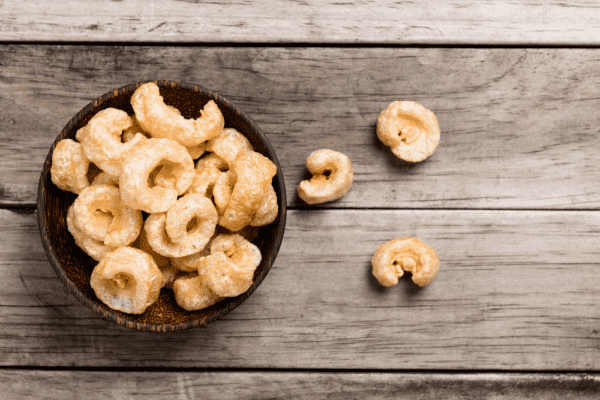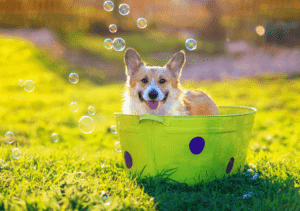Can dogs eat pork rinds? No, you must not let them have pork rinds; however, the pork itself is safe for dogs. Pork rinds (also goes by the name chicharrones, scratching, crackling, or pork skin) are low carb/ sugar food just like snacks but they contain loads of unhealthy ingredients such as trans fats, sodium, flavors, and preparation technique that are harmful to dogs.
Moreover, pork rinds are fried in oil which also poses a subsequent danger to your dog. In shorts, pork rinds are not a dog-friendly treat.
Read this article before you share pork rinds with your dog because eating pork rinds could put you in misery by causing serious sickness to your dog and/ or a heavy vet bill from your pocket.
Table of Contents
Are Pork Rinds Safe for Dogs?
It’s a wonderful feeling being watched by our furry friend especially whilst enjoying our food. Every time you eat, it would lock eyes on you and exploit you with their innocence to get their share of the meal.
Like every dog owner, you would want to feed your dog whatever you are eating. There are many scrumptious foods that we would like to share with our dogs.
But just like a human, there is a certain food that is unhealthy for your pets. The key thing to understand is that humans and animals have a different digestive systems.
This is the very reason that giving too much human food to your dog can make them sick. It is worth mentioning that chocolates, grapes, nuts, chives, onions, and garlic are also poisonous to dogs.
Pork Rinds Ingredients and Hazards

Pork rinds are generally made with pork skin and fat trimmings. The preparation process either includes baking or frying after applying certain spices on them just to make them tastier and crispier. While spices add flavor to your food but unlike a human, dogs have different taste buds and digestive systems. Here are some hazardous things for dogs: –
- Spices like Nutmeg, Garlic and onion are highly toxic for dogs and can harm them
- Cooking oil is not suitable for dog’s stomach
- Consuming Salt by dogs can cause salt poisoning
- Pork rinds are full of fats such as: –
- 5 deep-fried pork rinds have 27 calories, 1.56g fat, cholesterol 5mg, sodium 92mg, 0g carbs, and 3.06g protein.
- 1 cup of pork rinds has 174 calories, 10.02g fat, cholesterol 30mg, sodium 588mg, 0g carbs, and 19.62g protein.
- The daily caloric needs for humans are around 2500 calories, whereas, for dogs, it varies from 200 to 1350 calories depending upon the size of the dog.
- 1 cup of pork rinds can have approx 30% of a dog’s daily recommended calories. Pork rinds contain 588mg of sodium per ounce which is considered 80% of the daily allowance for dogs. Doing all the calculations, you would have an idea of how toxic pork rinds are for your dogs. Furthermore, if you let your dog eats pork rinds frequently, it might also lead them to salt poisoning.
In a nutshell, feeding pork rind to your dog is a meal full of fat and spices. As we know an excessive amount of fat is not recommended for anyone especially for dogs. Fatty food has many health-related issues for both humans and dogs.
In dogs, they can cause pancreatitis, damage kidneys or arteries with time, and would lead to obesity or even death in some conditions.onditions.
What about Pork Skin?
Raw pork skin usually does not cause a lot of stomach issues in dogs as compared to pork rinds but just like pork rinds, pork skins are mostly coated in salt before cooking. which is not safe for dogs and could lead them to salt poisoning, and many other health-related problems.
What if Your Dog Eats Pork Rinds?
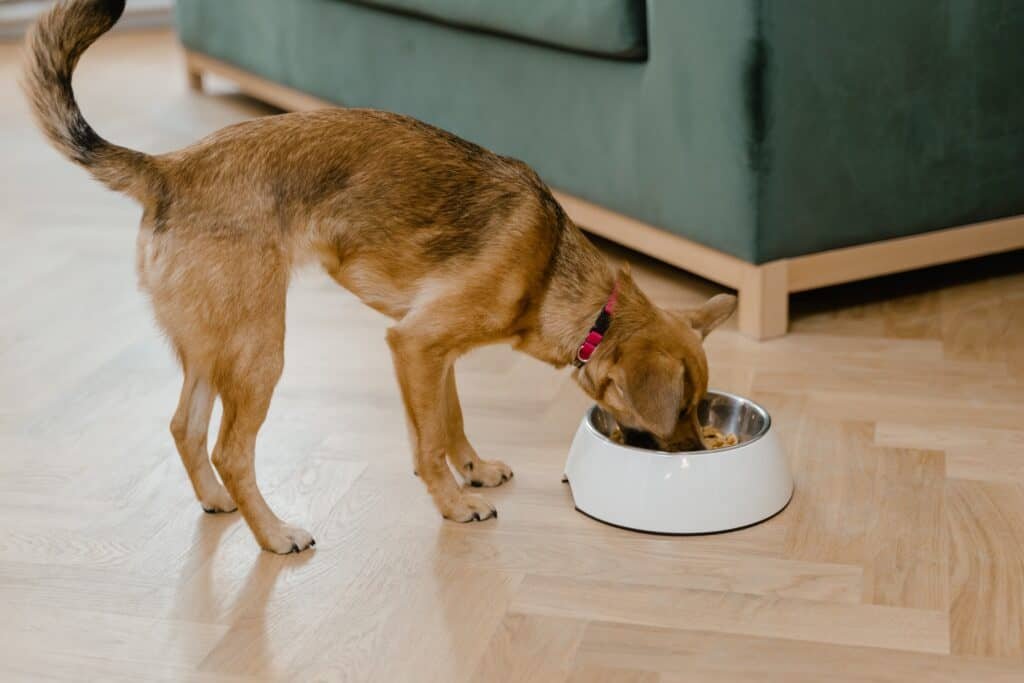
Eating a small chunk of pork rind or raw pork skin will not instantly kill your dog or poison it at all. Most of the time we do things that we do not know about. Off course, you care about your dog and would want it to be healthier and happier, but in case it got a mouth on pork rinds, then here are some tips that may be useful for you: –
- First of all, there is nothing to be worried about. Eating pork rinds once in while won’t do anything worse to your dog.
- Secondly, the problem arises when you feed your dog too much pork rinds or on daily basis.
- Thirdly, your dog simply cannot consume pork rinds regularly because it cannot simply digest too much of the fat, which would result in upset stomach problems or worse; ultimately would draw your attention to take them to the vet. However, there is always a first time for everything and accidents do happen in life, so beware.
Well let’s consider a worse situation, saying your dog has eaten a small chunk once or has been into this for a while, then you need to observe it over for the next 24 hours to conclude if it needs a medical emergency or not? You need to monitor its behavior. Here are some major physical symptoms: –
1. Upset Stomach
Similar to humans the dog may experience dizziness, diarrhea, vomiting, nausea, fullness. These symptoms would cause behavioral changes in the dog for example mood swings, reaction to touch, no eagerness to play or walk, struggling to pass a bowel movement, and curling up or hunching over. In this case, make sure your dog stays hydrated. Keep fresh water in its reach and restrict excessive physical movement to let it sustain the remaining fluid in its body.
If these symptoms go away in 24 hours or so, then there is nothing to be worried about. All you need to do is to sit tight and avoid any unhealthy food for the next 5 to 7 days, during which the self-healing process will take over and your dog will feel alright; however, if the symptoms persist or get worse, a visit to the vet would a must thing.
2. Salt Poisoning
Salt poisoning or sodium ion poisoning is an alarming situation that causes vomiting, diarrhea, and dehydration. It happens when your dog consumes a specific amount of salt. Since pork rinds or pork skins have a salt coating or are marinated with different spices, eating them can put your dog in a serious situation.
It is not necessary that a huge amount of pork rinds or skins has to be consumed by your dog to become salt poisoned but smaller dogs can get poisoned by consuming only a significant amount of it. Dog body is naturally designed in a way that it cannot handle an excessive amount of salt.
This imbalance their bodily fluids system. As a result, the body will release extra water just to bring balance to the fluid system which would result in vomiting, diarrhea, and dehydration.
Some of the common symptoms of salt poisoning are: –
- High Fever
- Vomiting
- Weakness
- Excessive Urination
- Diarrhea
- Lethargy
- Excessive Thirst
- Seizures
- Tremors
Salt poisoning is dangerous and may lead to death. If your dog experiences any of the above systems it is best to consult your veterinarian at the earliest.
3. Home Treatment

If the symptoms are mild and do not require vet treatment then there are the following things that would help your dog recover at home: –
1. Limit Physical Activity: As discussed earlier, in case of upset stomach or salt poisoning the body releases fluid in different ways, ultimately making the dog weaker. If you do not let your dog rest, it will get further sick by consuming whatever fluid is remaining in its body. Minimizing physical movement will reduce further loss of bodily fluids.
2. Provide Clean Water. Water contains minerals and other healthy elements. It plays a vital role in the recovery of your dog. Be sure to provide clean and fresh water to your dog and keep it hydrated.
3. Maintain Normal Temperature. Keep your dog at a normal temperature. Exposing it to extreme temperature can cause sweating which again leads to dehydration.
4. Bland Diet. Feed your dog baked chicken and plain white rice for 2-3 days.
5. Avoid leftovers. Avoid human food and do not feed your dog any leftovers. Believe me, you don’t want to go back there again. Make sure to follow a strict diet plan including only dog food, a bland diet, and a lot of water.
6. Probiotic. Our body has good and bad bacteria present in a balanced amount. When you get an infection, bad bacteria take over good bacteria, thus causing an imbalance in your body. This is what makes your stomach upset. To naturally bring the balance probiotics are helpful. Probiotics are good bacteria that provide health benefits by eliminating extra bad bacteria from your body, thus bringing a natural balance in your body. Similar to humans, there are probiotics available for your dog, such as: –
- Purina ProPlan “FortiFlora” in powder form
- Capsules
- Chews
- Dog foods
- Yogurt or kefir with live cultures
7. Avoid Overfeeding. Whilst water plays a vital role in the treatment of your dog and drinking a lot of water makes it better, not worse; however, if you apply the same concept to food and feed your dog too much of bland diet and dog food, you will only make it worse. Just be patient and do not rush. Let it heal naturally.
Why Pork Rinds? Do They Provide Any Nutritional Benefit?
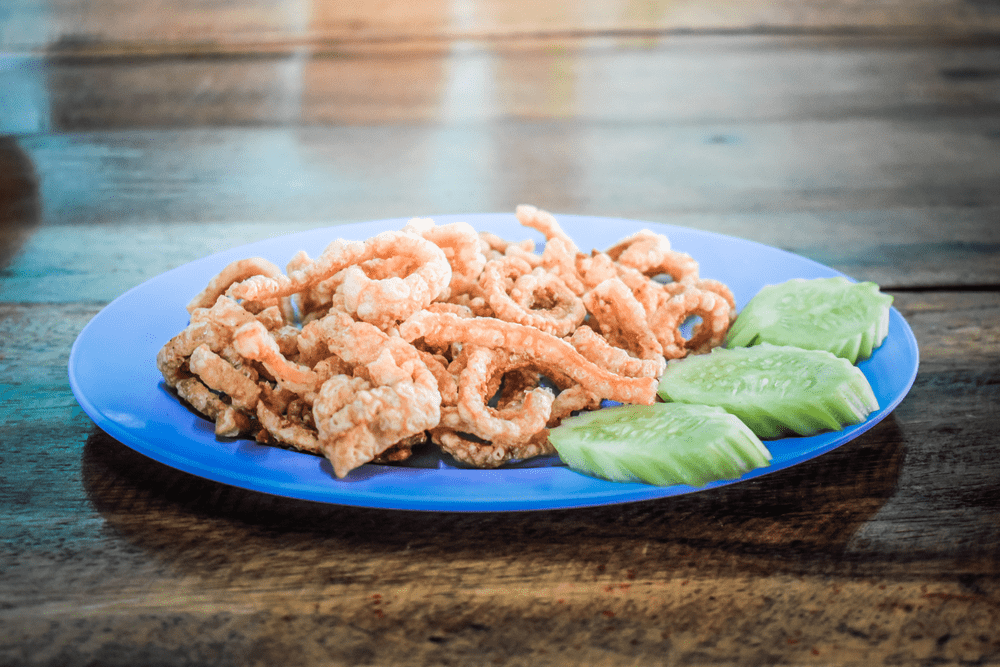
Pork rinds or pork skins do not provide any nutritional benefits for your dog. Their cooking process is extremely toxic to dogs. They are loaded with fats and spices that are harmful to dogs.
Consuming pork rinds or skins regularly can cause health issues. It can result in canine death, shorten the life span of dogs or make them live a poor quality of life.
Therefore, it is better that you feed your dog its natural food to keep a balanced diet and daily allowance of calories.
What Else is Toxic for Dogs?
As dog lovers, we always want to cheer them and share a piece of food that we are having at that moment. Of course, we do it in our innocence and love for our dogs.
Read Also: Why do dogs eat paper
But this could cause low to severe health problems. There are plenty of foods out there that may be harmful to your dogs. Here’s a list of some common food that might be dangerous:
Chocolate
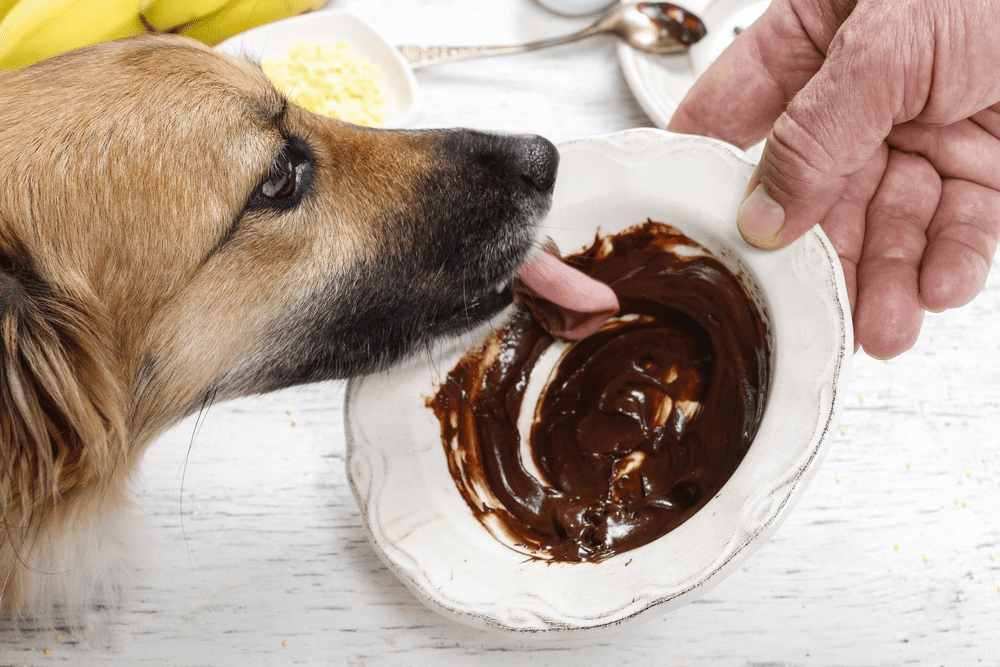
The major ingredient of chocolate is caffeine and xanthosis, also called theobromine. Theobromine does not completely solve in water and has a caffeine-like effect but is minor as compared to caffeine.
There is 1 grain of theobromine in 1 oz of milk chocolate and 3 grains in 1 oz of dark chocolate. Caffeine and Theobromine both affect humans and animals. Here are some complications associated with the consumption of theobromine by humans and dogs: –
Human
- Consuming 0.8–1.5 g/day (50–100 g cocoa) may result in sweating, trembling, and severe headaches in most people
- Consuming 250 mg may result in mood swings of some people
Dogs
- Theobromine is slightly water-soluble
- Because of its negative effects, it is the only reason why chocolate is poisonous to dogs
- Animals thatmetabolize theobromine slowly especially dogs, can get theobromine poisoning from as little as 50g (1.8 oz) to 400g (14 oz) of milk chocolate depending on the size of the dog.
- Dark chocolates contain 10 times more theobromine as compared to milk chocolate. That’s why dark chocolate is far more toxic to dogs.
If your dog has consumed chocolate, here are some symptoms of chocolate poisoning that you might to know: –
- Seizures and death
- Fatigue
- Diarrhea
- Tachycardia
- Vomiting
Vegetables
Vegetables like onions, garlic, chives, shallots, and leeks in any form (raw, cooked, fried crushed, or dried) are lethal for dogs, even in a smaller amount. These vegetables destroy RBC (Red Blood Cells), causing anemia in dogs. Here are symptoms of onion poisoning: –
- Vomiting
- Diarrhea
- Dark or Pink Urine
- Fatigue
- Anorexia
- Passing Out
- Tachycardia
Processed Meat
Processed, marinated, or cooked meat that includes bacon, bacon grease, pork rind, pork skin, ham, BBQ, smoked meat, and fat trimmed contains a lot of spices and fat. BBQ sauce is injurious to dogs because it contains a high proportion of salt, sugar, onion, and garlic.
This can cause canine obesity or salt toxicity. Salt toxicity leads to pancreatitis, diarrhea, vomiting, and other stomach problems in dogs. It’s best to serve plain meat to your dogs.
Salty Snacks
Eating salty snacks like chips, pretzels, and fries once in a while does not cause a severe problem but feeding your dog on regular basis can cause salt poisoning. Some dogs have heart issues. Eating salt can trigger their BP. Consumption of salty food can lead to an emergency.
Nuts
Nuts allergy is one of the most common food allergies out there. In nut allergy our body overreacts to the proteins found in nuts and treat them as foreign body; thus, trying to knock them off. Some of the nuts available in the market are covered in chocolate so any type of nuts like peanuts, pistachios,
Macadamia can cause vomiting, fatigue, and tremors. Other nuts that contain fat, like almonds and walnut, can cause stomach issues or pancreatitis if consumed in a large amount.
Sugar or Sugar Substitute (Xylitol)

Anything with sugar or its substitute is also not safe for dogs. Nutella, peanut butter, and sugar-free candies have xylitol in them and should not be given to dogs, even in small amounts. This could cause vomiting, fatigue, low blood sugar level (hypoglycemia), seizures, or liver failure (cirrhosis).
Fruits
Fruits that are rich in sugar or fats, like Avocados must not be given to dogs. Sugar-rich fruits can result in pancreatitis in dogs.
Yeast
The yeast in some food items is said to grow inside a dog’s stomach, which results in an enlarged stomach. In some cases, it could lead to a fatal condition like bloat, in which the stomach twists over on itself. One of the yeast enrich food is unbaked dough. Yeast in the raw dough also produces ethanol (alcohol) and can cause ethanol poisoning.
This could result in seizures and respiratory failure. Yeast is considered to be the most dangerous food item for dogs out there. If the dog has swallowed dough, it will try to vomit first but might fail because the yeast would have already distended too much inside its stomach.
Vinegar

Vinegar is not suitable for a dog’s digestive tract. Vinegar is often used for flavoring, meat tenderizing, or topping human food. Which is often undiluted especially in pork rind flavoring. This can cause stomach problems such as gastrointestinal upset. If your dog is sick, has a stomach problem, or has kidney-related issues, then it’s best to keep your dog away from vinegar food.
Here are the symptoms of a gastrointestinal upset: –
1. Diarrhea
2. Vomiting
3. Dehydration
4. Weakness
Alcohol
Beverages or food that contains alcohol must not be given to dogs. Many foods are prepared using alcohol, for example, beer grilled chicken, chicken cacciatore, chicken marsala, and specially Bratwursts which is a type of German sausage made from veal, beef, or most commonly pork by boiling the meat in beer.
Another example is Chili con carne. It is completely cooked in beer instead of water. Other than these dishes, giving a sip of alcoholic beverages to your dog is extremely dangerous.
Often your dog sniffs around and licks up the spilled drink. This is something you must be very careful about. The reaction time to alcohol is very quick and fatal. Some of the serious medical issues are as follows: –
1. Respiratory Failure
2. Seizures
3. Hypothermia
4. Death
As a dog owner, you should be extra careful and always keep an eye on it. You must strictly stick to dog foods only. Feed your dog in your presence. Make routine vet appointments once a month or as per your need/ ease.
Alternate Foods for Pork Rinds?
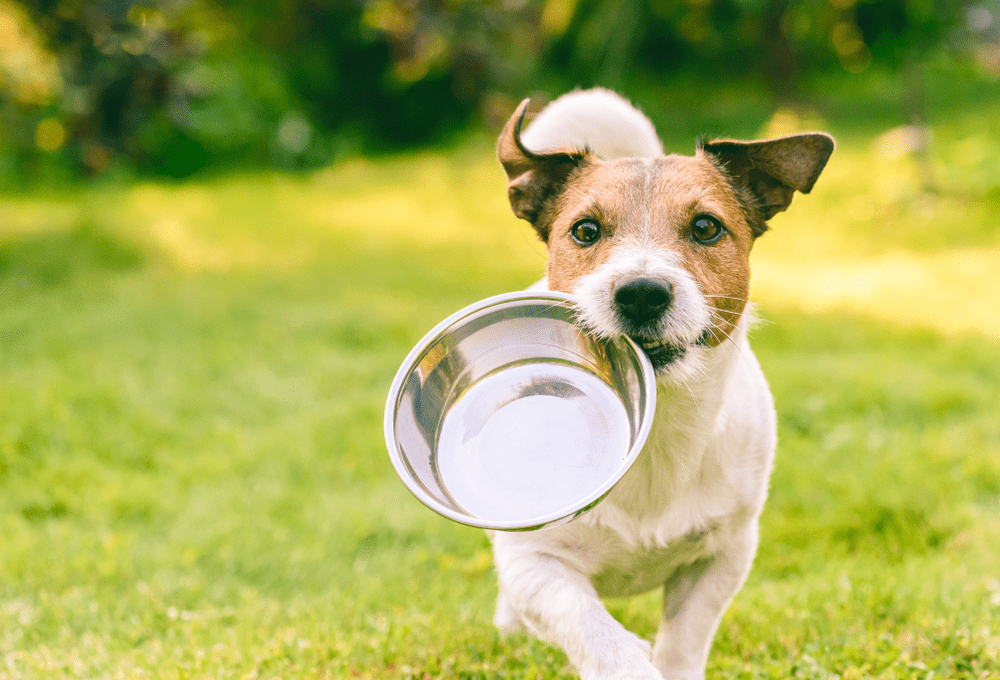
Dogs can have a variety of foods as long as it meets the dietary criteria. It is always encouraged to carry a diet plan for your dog. Healthy food includes protein, carbohydrates, and good fat. Following are some suggested foods that make great treats for your dog: –
1. Chicken
2. Beef
3. Turkey bones
4. Uncooked Fish
I Still Want to Feed My Dog Pork Rinds
There may be a few of you who would still want to feed pork rinds to your dogs, regardless of the danger associated with it. Well in that case homemade pork rinds or cracking can be given to your dog once in a while, only if it does not have a weak stomach. Here are some of the safety guidelines to prepare pork rinds at home: –
Spice Free
- It must be spice-free. Meaning you cannot add any spices or even salt to make it taste better
- The pork itself may not cause any problem to your dog but the spices will surely cause the stomach problems
- It doesn’t take much for your dogs to react very poorly to a lot of excess spice, usually beginning with them having a difficult time breathing but then inevitably causing them to vomit or have extreme diarrhea.
Oil and Fat-Free
- Whilst raw pork is something, deep frying or cooking pork in oil would cause weight gain and liver problems and you don’t want that.
- If you still want to cook it then you need to fry the pork skin in its fat to make it safer for your dog.
- As established earlier, fat is not safe for your dog. Therefore, make sure to remove the possible amount of fat before giving it to your dog.
Serving Small Amount
- Pork rinds may be served in a small amount to your dog
- Remember we do not want our dog to overeat and gain weight. Although overeating has its cons but for now pork rind is something that is not entirely safe for your dog
Monitoring
- Finally, you need to monitor your dog every step of the way after they have eaten this homemade pork rinds concoction.
- It’s crucial to make sure that they can eat these pork scratchings in very small amounts before you even think about giving them anymore, double verifying that pig products aren’t going to wreck their health.
Conclusion
It is not safe to share too much human food with dogs. Dogs simply cannot digest all human food. We do tempt to share our meal with dogs, of course, they are drawn to the smell of pork rinds, chicharrones, scratching, crackling, or pork skin but dogs are innocent and loving creatures.
We must behave like responsible owners and caretakers of our furry friends and not let them eat everything, instead, we might make a strict dog diet for them.
Whilst raw or cooked pork is safe for your dogs, it’s the pork rinds or skins that are not pleasant for dogs because of the oil and spices used to make them. It is recommended to always consult with your vet before giving anything new to your dog.

